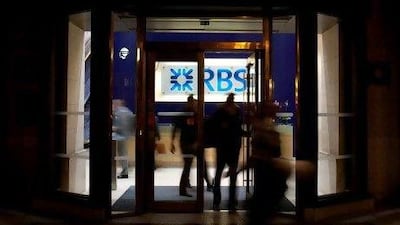Legal action against any part of Dubai Inc - the shorthand for the interlocking group of government-linked companies at the apex of the emirate's commercial infrastructure - is a rare event.
Now, an arbitration process has been set in train by three western banks. But Royal Bank of Scotland, Commerzbank of Germany and Standard Bank of South Africa have chosen to launch their legal move in London, well away from the emirate's own judicial system.
The case is riddled with legal and financial complexity but its origins lie within the financial crisis of 2008 and 2009 when Dubai's already stretched credit lines came close to breaking point in the global credit crunch.
The immediate threat to the emirate's financial structure was neutralised in early 2010 by the restructuring of US$24.9 billion (Dh91.45bn) of debts owed by the Dubai World conglomerate, when creditors, including the three banks involved in the present action, agreed to put off seeking repayment for five to eight years.
However, it soon became apparent that other parts of Dubai Inc were also experiencing credit problems. In particular, Dubai Holding, the conglomerate that owns the Jumeirah hotel chain, Tecom business parks and numerous financial assets, had debts of at least $10bn.
Another clear trend that has emerged since the Dubai World episode is for Dubai entities to repay fixed interest debt, including sukuks, on time and in full, as was the case this year with two repayments from DIFC Investments and Jebel Ali Free Zone, or Jafza.
Bank creditors, on the other hand, could expect long sessions of tough restructuring negotiations.
The bankers took a particularly strong stance over Dubai Group, a unit that contained a collection of financial assets of falling value in the post-2008 environment and which owed about $6bn of the total.
Restructuring talks were triggered in 2010 when it missed interest payments on loan facilities and have been going on ever since.
If the banks have been playing hardball, the Dubai Government has returned it with equal determination. At the beginning of the year, in a move that angered creditors, the Government said it was not prepared to guarantee the bonds of Dubai Group, as it had done to the tune of billions of dollars with Dubai World.
The terms of the original syndicated loan, it was argued, meant Dubai Group was insulated and there was no recourse to Dubai Holding nor to its owner. Dubai Group is not a quasi-sovereign lender.
The resulting stalemate meant talks involving about 40 creditors ground to a halt, with RBS, Commerz and Standard publicly walking away from the negotiating table. Some creditors particularly objected to extending some of the repayment schedules by as much as 12 years.
So what drove the banks to the extreme measure of an arbitration action in London?
"It's probably a reflection of the fact that these banks are fed up with what they are being offered and also the difficult funding conditions they face in their home markets," says Said Hirsh, a Middle East analyst with Capital Economics, a consultancy based in London.
"Since their domestic exposure to the UAE market has been greatly reduced since the crisis, they have little to lose from upsetting the Dubai Government," he adds.
Other experts believe the three banks are taking a risk by seeking recourse to the courts. "It could be a politically costly measure on their part but they must have figured that, with their backs to the wall, they could force [the Government] back to the negotiating table," says Ahmad Alanani, a director of Exotix, an investment firm based in Dubai focusing on distressed assets.
If that is the case, it is a delicate call by the banks. RBS, in particular, still has a substantial presence in the UAE, which is the headquarters for its business in the Middle East and Africa where it employs 200 people.
Although the UK lender, as part of a global review, has pulled out of retail banking in the region and closed its corporate advisory business, it still has significant business in debt capital markets, risk and transaction services. Both Commerz and Standard have much smaller operations in the UAE.
Perhaps mindful of the risk of alienating the Dubai authorities, all three banks signed a statement holding out the possibility of a non-legal settlement to the issue. "We remain open to such an outcome if an acceptable commercial resolution is forthcoming," they said.
For its part, Dubai Group has shown that it is equally amenable to an amicable solution. "We believe we can reach a consensual agreement with our shareholders," said a spokeswoman.
In any case, the legal confrontation is being played out against a more benign financial background for the emirate.
"The important point is that this is no longer affecting the Dubai sovereign [debt]," says Mr Hirsh.
"Bond yields and the premiums on credit default swaps [a measure of the likelihood of default] continue to fall. It seems that investors have stopped linking troubles at Dubai's government-related enterprises with its sovereign [borrowing]," he says.
"They key point is that Dubai's sovereign debt now has a low risk of default."

